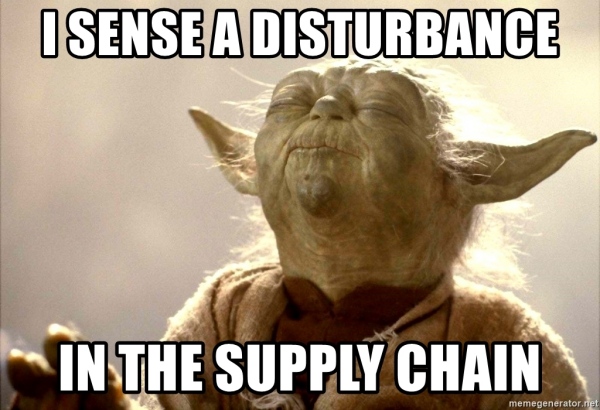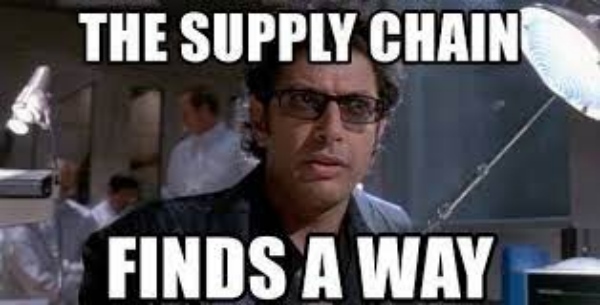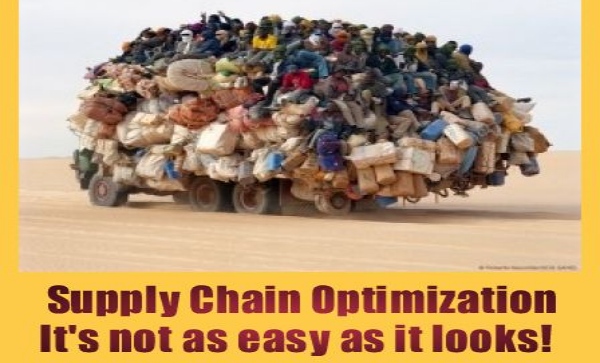Of supply chains, or why global is personal these days
Global is personal. It really is.
Mandatory premise: why this post exists
If people did POSSE and RSS there would be much less online noise and much more visibility of “stuff that EVERYBODY should know”. Since this is not happening yet, I put together this post about something very important, because Twitter threads are cool, but pretty hard to read constructively, and much harder to preserve.
Where is all our stuff hiding?

“Why are we running out of everthing?” “Why is shipping so slow?” “Why are things more expensive?"
This posts summarizes and comments a Twitter thread by @hockendougal about those questions, that is about what’s going on with global supply chains.
@hockendougal thought it would be worth it to collect some of the articles documenting the disruption/catastrophe/reality of it all. I have listed those articles separately, at the end of this post. The next paragraphs are a synthesis of the rest of the thread.
Everybody is short of everything

Or so we used to believe, that is.
</em></u>
There have been some good overview pieces on this, from stuffed giraffes to fertilizer boxes, as well as summmaries of “why the world is still short of everything”, and we should all get used to it, because globalization means that “delay and shortages in any one place rippling out nearly everywhere”.
Shipping is the most proximal cause for supply chain snags. At the Port of Los Angeles average wait time has increased to 8.5 days (was 4.7 in June). In general, ships are 2-3x the size of 10 or 15 years ago. They take longer to unload, need more trucks, more trains, and more warehouses.
BUT, Even before the pandemic, labor hadn’t scaled the same way.
For goods coming to the US from China by sea you see an increase in time required from factory to port of 40-50%.
The cost for the company shipping that container may be 4-5x as much as it used to be (from a few thousand to $15-16000 a container).
This has been building for months now.
Congestion in China is even worse, partly due to stricter COVID protocols for arriving vessels.
This crisis of distribution produces crises of production in OTHER places. In the automative industry, for example, shortages have led GM to stop operations in the US, just as Toyota has in Japan.
Peak complexity or peak uncertainty? What’s the difference?

In many respects, the real problem here is uncertainty. It doesn’t actually matter how long a container ship takes, as long as it is exactly predictable, and companies can build routines out of it, that are stable, but also with no margin for errors.
The pandemic, instead, has “produced” uncertainty across the planet, in nearly every sector and side of production and distribution, from worker availability to resource management models and consumption patterns.
Shipping congestion is not limited to the sea. Several railyards are packed with containers, and the global shortage of truck drivers started in the mid-2000s, which made them feel like “throwaway people”, was only exacerbated by COVID-19, which put a lot of “owner-operators” truckers out of work.
Global climate change can only increase their frequency of these kinds of disruptions, especially because man ports, warehouses, rail and roadways are not ready to handle them (3).
Besides, modern productions are incredibly complex: too much stuff done with parts sourced from a dozen different companies in various countries. Instead of “regional microprocessors”, for example, there are “little-known” countries and companies that play crucial roles in production, from Malaysia for semiconductors (12) to pipette tips (1) and bicycles (7).
So what’s being done about it?
Chinese manufacturers are now producing record volumes of freight containers. But its more a problem of *stuck containers (11) than their mere, total number. Even warehouse space is limited, with increased competition (and increasing prices) across the sector.
What makes matters worse is that problems can feed back on themselves, for examples with heavy-duty truck makers struggling with shortages.
In case you noticed, there is no complete solution in sight. None that would work fairly for everybody, that is. The least worst thing, if this situation lasts long enough, may be rationing certain primary goods.
Supply chain articles mentioned in the Twitter thread
- 2021/04/28: blackouts, fires, and a pandemic are driving shortages of pipette tips — and hobbling science
- 2021/06/01: How the World Ran Out of Everything
- 2021/06/08: As storms become more frequent and volatile, some ports plan for the risk — but most do not
- 2021/06/15: How ‘Chaos’ In The Shipping Industry Is Choking The Economy
- 2021/06/16: What’s going on with global supply chains: A primer for the casual consumer (AKA why that couch you ordered isn’t here…and isn’t getting here tomorrow)
- 2021/06/22: Warehouse Rents Surge on Bidding Wars for Scarce Space
- 2021/06/28: Why the global bike shortage isn’t ending soon
- 2021/08/01: The global supply chain was not built for this': freight delays hammer US
- 2021/08/18: How natural disasters reshape supply chains: Lessons for the COVID-19 crisis
- 2021/08/28: [“One Stuck Box of Fertilizer Shows the Global Supply Chain Crisis”
- 2021/08/20: China bulker pileup dwarfs California container-ship gridlock
- 2021/08/29: Covid-19 Surge in Malaysia Threatens to Prolong Global Chip Shortage (“little-known but critical link in semiconductor supply chain”)
- 2021/08/30: The World Is Still Short of Everything. Get Used to It.
- 2021/08/30: Not a normal life': truck drivers warn of burnout as global shortage bites
- 2021/09/03: Chip Shortage Curtails Heavy-Duty Truck Production
- 2021/09/08: “Why Is Everything More Expensive Right Now? Let This Stuffed Giraffe Explain”
- 2021/09/14: An all-time high of 56 cargo ships are stuck waiting off the California coast, as shipping ports hit their 4th record backup in three weeks
- 2021/09/15: Record freight container production fails to ease supply-chain crisis
Who writes this, why, and how to help
I am Marco Fioretti, tech writer and aspiring polymath doing human-digital research and popularization.
I do it because YOUR civil rights and the quality of YOUR life depend every year more on how software is used AROUND you.
To this end, I have already shared more than a million words on this blog, without any paywall or user tracking, and am sharing the next million through a newsletter, also without any paywall.
The more direct support I get, the more I can continue to inform for free parents, teachers, decision makers, and everybody else who should know more stuff like this. You can support me with paid subscriptions to my newsletter, donations via PayPal (mfioretti@nexaima.net) or LiberaPay, or in any of the other ways listed here.THANKS for your support!